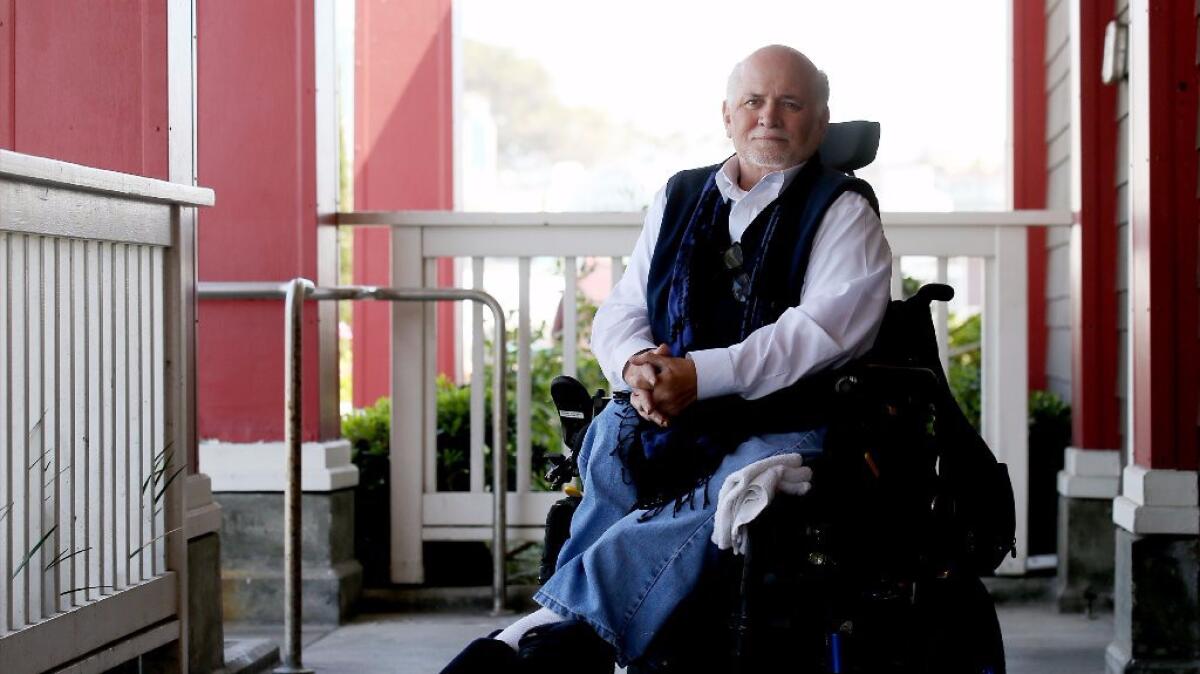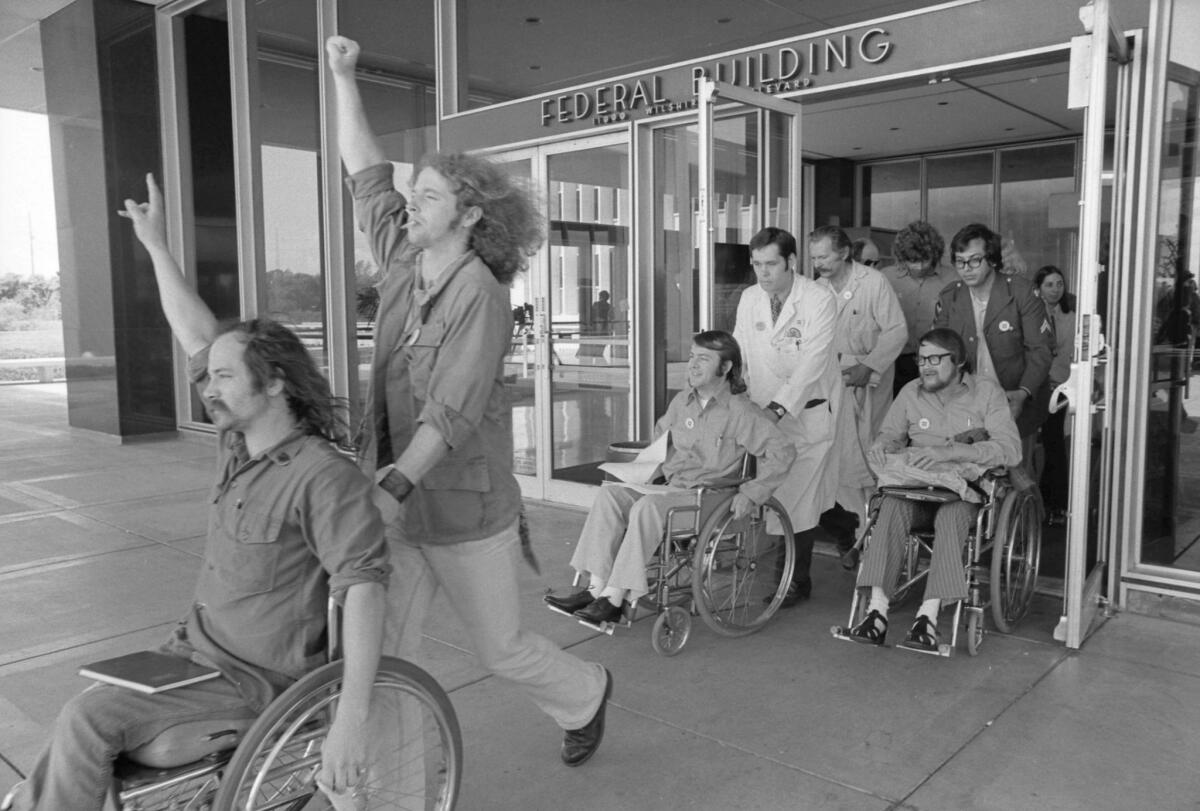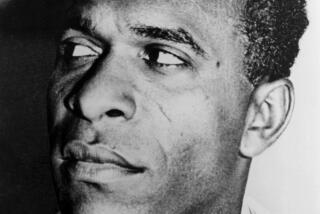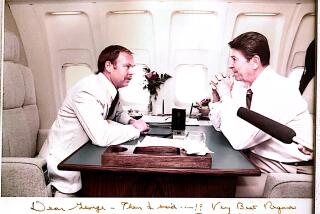Column: The Vietnam warrior who wrote ‘Born on the Fourth of July’ recounts another fight

I don’t know how Ron Kovic does it.
Forty-eight years in a wheelchair, paralyzed from the chest down.
Forty-eight years of simple things being difficult, Vietnam still casting shadows.
And yet for Kovic there’s drive and determination, goals to meet and plans to keep.
After the war, he was so filled with rage and despair, he didn’t think he’d live to see 30.
In a fevered race with mortality, he wrote the acclaimed “Born on the Fourth of July” in less than two months, ripping pages out of a Sears & Roebuck manual typewriter purchased in Santa Monica.
After the war he was so filled with rage and despair he didn’t think he’d live to see 30
Now, that book about his evolution from U.S. Marine and battlefield warrior to anti-war activist is 40, and the Fourth of July baby is approaching 70.
We met for lunch Wednesday at a seaside restaurant near Kovic’s home in Redondo Beach, and when he reached for a cup of coffee on the table in front of him, I saw him wince in discomfort. His shoulders are worn out after nearly a half a century of hoisting himself in and out of the chair.
And yet, to hear him tell it, he leads a relatively normal life. He writes, drives a specially equipped van, visits friends, goes to favorite restaurants. He got dreamy-eyed when he talked about girlfriend TerriAnn Ferren, who works at the Torrance Cultural Arts Center and writes a weekly column for the Torrance Tribune.
“She’s wonderful,” Kovic said of Ferren, whom he met at a party, under a full moon, at the home of former Lakers coach Bill Sharman and his wife Joyce.
Kovic told me he just bought Ferren a ninth-anniversary ring.
“I’m grateful to be here,” Kovic said. “I’m grateful that I can still contribute, give back, tell a story.”
Bottles of saline solution dangle from IV poles as Sharon scurries around the room emptying bags filled with urine
— Ron Kovic, in “Hurricane Street”
His first story was a smoldering sensation. Tom Cruise played Kovic in the Oliver Stone movie based on the book.
On July 4, a 40th anniversary edition of the book will be published, along with Kovic’s second book.
The new one is called “Hurricane Street,” and it’s another raw expose on the cost of war. The book, which he calls a prequel, drills deep into the 17-day drama of a 1974 sit-in and hunger strike staged by Kovic and a band of fellow wounded veterans who took the federal building on Wilshire Boulevard by storm.

Kovic, an outpatient who was living on Hurricane Street in Marina del Rey at the time, was tormented by nightmares and a sense of injustice. Those who made great sacrifices were shabbily treated and cared for, in his opinion. On Hurricane Street, he and others plotted their rebellion.
The coups made national headlines at the time, as the invading army of war casualties commandeered the 13th floor office of U.S. Sen. Alan Cranston. The men refused to leave until Cranston and VA officials answered their call for better healthcare at the Long Beach Veterans Administration Hospital’s spinal cord injury unit and other hospitals in the U.S.
Soon, Kovic writes, the senator’s office was like a MASH unit, mattresses everywhere. A supportive friend tended to the men’s needs, even as the physically injured and psychically wounded vets bickered over who was in charge and how best to make their case. They were riven with pain, depression, guilt, anger, paranoia and fear of enduring lifelong disabilities.
“Bottles of saline solution dangle from IV poles as Sharon scurries around the room emptying bags filled with urine...We have literally transformed Senator Cranston’s office into a make shift VA hospital ward. All the medical supplies that Eddie got are now lined up perfectly along the office windowsill: twenty-four irrigation-solution bottles, eleven boxes of latex rubber gloves, sixty tubes of lubricant for cleaning out our rear ends, six dozen plastic bags to put the crap in…
“Twenty-six catheter-change kits used to insert the catheters into our penises and inflate the little plastic bulbs inside our bladders, enabling us to urinate without wetting our pants. Several boxes of government diapers have been added for those who are incontinent.”
This story, like so many others related to the war, burned inside Kovic for years. He’d begun writing it, moved to other topics, circled back again but still couldn’t see it through. The breakthrough came one morning several years ago.
“He told me the story,” says Ferren, to whom Kovic dedicated his new book. “He just started talking and I thought quite frankly that he was making up a story as he went along...He said, ‘No, it’s all true.’
“I just couldn’t believe it and I said, ‘You have to write this down. Honey, this is history.’”
In the introduction, Kovic says he’s written a work of “memory and fiction,” condensing some events and building two composite characters. He changed some names and details “out of respect for privacy, and to fill gaps in my memory.”
This story, like so many others related to the war, burned inside Kovic for years.
The book is an unflinching anti-war declaration, written in blood and the sweat of too many haunted nights by a Vietnam Marine Corps sergeant who later opposed the wars in Iraq and Afghanistan.
“We need to be more thoughtful before we send another young American service person off to be involved in wars that need not be fought,” he told me.
In “Hurricane Street,” Kovic wanted to tell as honestly as possible the story of Vietnam veterans who felt betrayed, defeated and divided, but came together “and ultimately triumphed.”
Veteran care is better now, Kovic said, with many dedicated healthcare providers, and his own doctor at Long Beach VA is Vietnamese-American. But across the country, he said, more improvements and a greater commitment are needed, especially given delays in treatment and the unacceptably high rates of suicide among veterans.
Kovic writes that he no longer feels sorry for himself and no longer grieves as he did 48 years ago. Still, when he makes his regular hospital visits for treatment, he aches to leave quickly and return to the life he has made for himself.
“A man needs his dignity no matter how much he has lost,” he writes. “I am so grateful to be alive.
Get more of Steve Lopez’s work and follow him on Twitter @LATstevelopez
ALSO
Snowy plovers and massive condos — opposing forces we’ll meet on our coastal road trip
Taking in California’s majestic coast from Oregon to Mexico
Can a columnist named Lopez be fair to a candidate named Trump?
More to Read
Start your day right
Sign up for Essential California for news, features and recommendations from the L.A. Times and beyond in your inbox six days a week.
You may occasionally receive promotional content from the Los Angeles Times.







